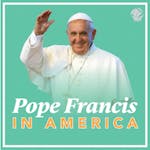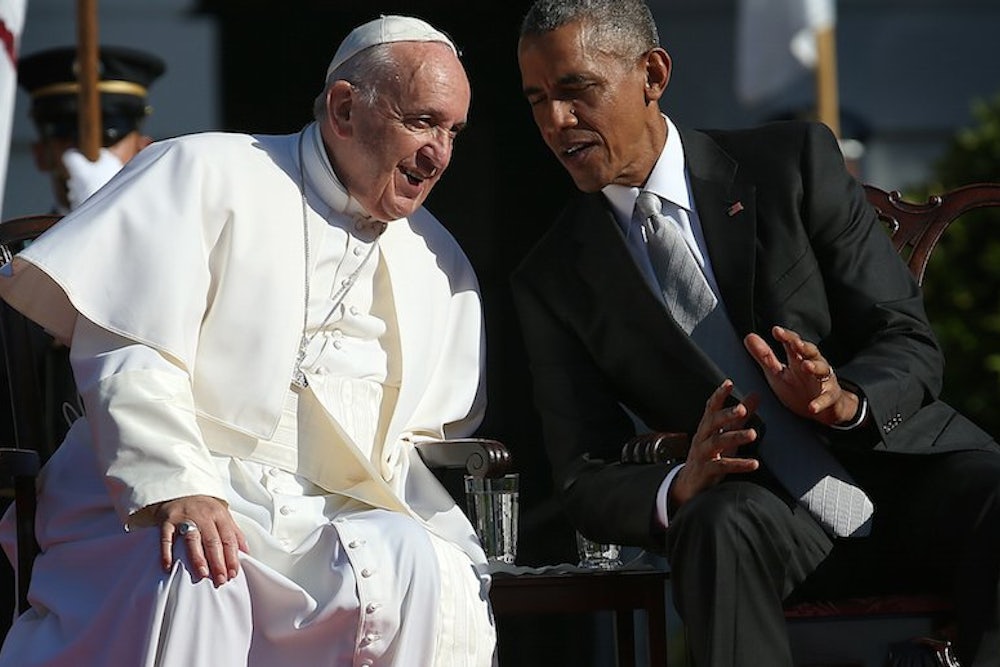
Pope Francis's address on the White House lawn Wednesday morning covered a range of topics, including religious liberty, inequality, immigration, and climate change. "To use a telling phrase of the Reverend Martin Luther King," the Pope said of the treatment of our "common home," "we can say that we have defaulted on a promissory note and now is the time to honor it." Francis explicitly referred to President Barack Obama's efforts to reduce air pollition; otherwise his remarks were general. But that hasn't stopped a common criticism from re-emerging.
The Pope should talk more about theology than politics. He's too political to me. Just stick to the traditions of the church please.
—
saintseamus
@tedcruz I love you Ted Cruz! But this pope is too political. His climate change BS and attacking success is wrong! https://twitter.com/tedcruz/status/646722003999719424 ...
—
nationofatlas
Indeed, throughout Francis's tenure as pope, critics have wondered if his interest in politics, perhaps the most worldly of earthly affairs, is unbefitting of the Vicar of Christ. “The charge that the pope is too political is not new,” history professor Walter Moss noted in a February essay, “and has just intensified in right-wing circles since Rush Limbaugh claimed in 2013 that the pope’s words regarding capitalism were ‘just pure Marxism.’” Perhaps distantly echoing Limbaugh’s disdain for papal politics, this year’s slate of GOP candidates have been quick to dismiss Francis’s approach to politics and economics, with New Jersey Governor Chris Christie recently saying, “The fact is that his infallibility is on religious matters, not on political ones."
Implicit in Christie's remark—and in much anxiety about Francis’s focus on politics—is the idea that the realm of religion and its moral considerations is somehow separate from the world of politics. The fact that politics are rightly conceived of as fraught by distasteful compromise and often corruption likely contributes to the separation of that dreadful enterprise from the heavenly, high-minded world of religion, where right and wrong are far more clearly demarcated. There is also probably some bleed between the idea of separating religious morality and political consideration, thanks to American regard for the idea of separating Church and State; but to split up the two institutions is a far more plausible endeavor than attempting to split up the two forms of deliberation.
In reality, politics is as much a moral theater as any other human activity. And we all bring our morals into politics.
To paraphrase Aristotle, the question before any democratic body is: How ought we live together? This is the foundational question of democratic politics, one that helps illuminate matters of government procedure (such as how to make decisions) as well as the goals of governance itself. If, as Michael Scaperlanda and Teresa Stanton Collett argue in Recovering Self-Evident Truths: Catholic Perspectives on American Law, “legal systems are meant to order relationships among human persons,” then laying out laws is a matter of making judgments as to how human relationships should be ordered. When we create laws in order to create peaceful relations between citizens, communities, states, and nations, we are communicating at the very least that we value peace, and likely a variety of other values that peace itself ensures: life, self-actualization, development, joy.
All of which are moral judgments. That living is better than dying and thriving is better than struggling are not straightforwardly objective calculations, but rather reflections of our shared investment in a particular vision of human life. (Bleaker, more martial cultures of the past might well disagree with us.) But these are the morality calls that underpin the enterprise of our politics, and in many ways the game of political rhetoric concerns various parties attempting to claim that their policies or missions more accurately reflect or achieve our values than their opponents’ do.
For that reason, it is both incoherent and absurd to claim Pope Francis is being especially daring by addressing politics from a moral perspective. It is incoherent because all people who talk about politics, be they clerics or politicians or ordinary citizens, do so within a framework of explicit or implicit moral premises. It is absurd because it isn’t possible to imagine politics without the moral concern that precedes the whole project of political life to begin with, namely how best to live public life in an orderly way.
For Pope Francis, ignoring political matters would mean ignoring a key component of the lives he is entrusted to care for and guide. Despite the suggestions of his critics, his statements about politics are not excessively detailed prescriptions; Francis has not proposed any bills, and he is not in the habit of trying to tinker with legislation. What he can do and does well is to highlight the moral dimensions of matters that might otherwise appear to be simple issues of calculation—that is, to point out that polluting the air is more than a question of what costs companies must endure to reduce emissions, but also a question of what we owe to our common home and the people we share it with. It has never been the case that Francis is too political, but is probably the case that politics is, oftentimes, not nearly morally conscious enough.
